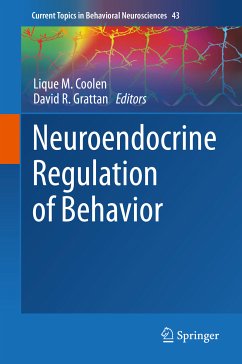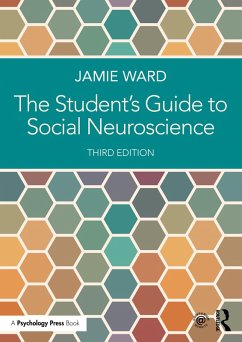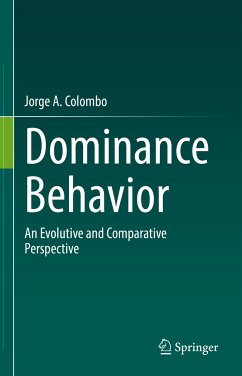
Neuroendocrinology of Behavior and Emotions (eBook, PDF)
Environmental and Social Factors Affecting Behavior
Redaktion: Caldwell, Heather K.; Albers, H. Elliott
Versandkostenfrei!
Sofort per Download lieferbar
128,95 €
inkl. MwSt.
Weitere Ausgaben:

PAYBACK Punkte
64 °P sammeln!
This volume highlights current research on how the neuroendocrine system helps to influence emotional states and ultimately behavioral output.Social relationships and context-appropriate behavioral responses are important for the survival of most vertebrate species. These relationships can range from transient social interactions to strong social bonding between sexual partners and social behaviors can be observed and evaluated from the individual- to the group-level. Further, behavioral output is shaped by complex interactions between the physical environment, genetics, experience, and contex...
This volume highlights current research on how the neuroendocrine system helps to influence emotional states and ultimately behavioral output.
Social relationships and context-appropriate behavioral responses are important for the survival of most vertebrate species. These relationships can range from transient social interactions to strong social bonding between sexual partners and social behaviors can be observed and evaluated from the individual- to the group-level. Further, behavioral output is shaped by complex interactions between the physical environment, genetics, experience, and context, and are often modulated by the neuroendocrine system.
In this book, experts in the field will provide a sweeping look at novel research in the neuroendocrine regulation of important behaviors ranging from parental care to social homeostasis, with a focus on comparative studies across vertebrate species. The first part of the book is dedicated to theneuroendocrinology of relationships, including the coordination of acoustic signals in songbirds, the complexity of social relationships in primates, and cooperation and parenting in humans. The second part of the book focuses on social behaviors and provides some insights into their regulation, including the neuroendocrine regulation of maternal behavior in rodents, the roles of oxytocin and vasopressin in the modulation of sex-specific social behavior, the interactions between adult neurogenesis, the neuroendocrine system and social behavior, and a consideration of neuroendocrine influences on reproductive decision making across species. The book concludes with a section on environmental influences on neuroendocrine systems underlying behavior, including how social isolation and endocrine disrupting chemicals affect the neuroendocrinology of behavior and emotions.
Given its breadth, this volume is appropriate for undergraduate students, graduate students, postdoctoral researchers, and established researchers who are interested in neuroendocrinology and behavior.
This is the sixteenth volume in the International Neuroendocrine Federation (INF) Masterclass in Neuroendocrinology series, which aims to illustrate the highest standards and highlight the latest technologies in basic and clinical research and aspires to provide inspiration for further exploration into the exciting field of neuroendocrinology.
Social relationships and context-appropriate behavioral responses are important for the survival of most vertebrate species. These relationships can range from transient social interactions to strong social bonding between sexual partners and social behaviors can be observed and evaluated from the individual- to the group-level. Further, behavioral output is shaped by complex interactions between the physical environment, genetics, experience, and context, and are often modulated by the neuroendocrine system.
In this book, experts in the field will provide a sweeping look at novel research in the neuroendocrine regulation of important behaviors ranging from parental care to social homeostasis, with a focus on comparative studies across vertebrate species. The first part of the book is dedicated to theneuroendocrinology of relationships, including the coordination of acoustic signals in songbirds, the complexity of social relationships in primates, and cooperation and parenting in humans. The second part of the book focuses on social behaviors and provides some insights into their regulation, including the neuroendocrine regulation of maternal behavior in rodents, the roles of oxytocin and vasopressin in the modulation of sex-specific social behavior, the interactions between adult neurogenesis, the neuroendocrine system and social behavior, and a consideration of neuroendocrine influences on reproductive decision making across species. The book concludes with a section on environmental influences on neuroendocrine systems underlying behavior, including how social isolation and endocrine disrupting chemicals affect the neuroendocrinology of behavior and emotions.
Given its breadth, this volume is appropriate for undergraduate students, graduate students, postdoctoral researchers, and established researchers who are interested in neuroendocrinology and behavior.
This is the sixteenth volume in the International Neuroendocrine Federation (INF) Masterclass in Neuroendocrinology series, which aims to illustrate the highest standards and highlight the latest technologies in basic and clinical research and aspires to provide inspiration for further exploration into the exciting field of neuroendocrinology.
Dieser Download kann aus rechtlichen Gründen nur mit Rechnungsadresse in A, B, BG, CY, CZ, D, DK, EW, E, FIN, F, GR, HR, H, IRL, I, LT, L, LR, M, NL, PL, P, R, S, SLO, SK ausgeliefert werden.
Alle Preise in Euro und inkl. der gesetzl. MwSt. | Innerhalb Deutschlands liefern wir preisgebundene Bücher versandkostenfrei. Weitere Informationen: bitte hier klicken
Support
Bitte wähle dein Anliegen aus:
Rechnungen
Bestellstatus
Retourenschein
Storno












